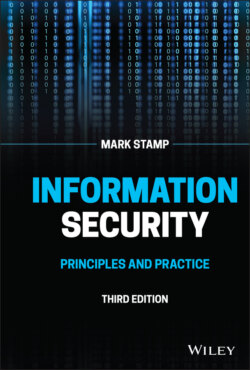Читать книгу Information Security - Mark Stamp - Страница 16
1.2.1 Confidentiality, Integrity, and Availability
ОглавлениеConfidentiality deals with preventing unauthorized reading of information. AOB probably wouldn't care much about the confidentiality of the information it deals with, except for the fact that its customers certainly do. For example, Bob doesn't want Trudy to know how much money he has in his savings account. Alice's Bank would also face legal problems if it failed to protect the confidentiality of such information.
Integrity deals with preventing, or at least detecting, unauthorized “writing” (i.e., changes to data). Alice's Bank must protect the integrity of account information to prevent Trudy from, say, increasing the balance in her account or changing the balance in Bob's account. Note that confidentiality and integrity are not the same thing. For example, even if Trudy cannot read the data, she might be able to modify it, which, if undetected, would destroy its integrity. In this case, Trudy might not know what changes she had made to the data (since she can't read it), but she might not care—sometimes just causing trouble is good enough for Trudy.
Denial of service, or DoS, attacks are a relatively recent concern. Such attacks try to reduce access to information. As a result of the rise in DoS attacks, data availability has become a fundamental issue in information security. Availability is a concern for both Alice's Bank and Bob—if AOB's website is unavailable, then Alice can't make money from customer transactions and Bob can't get his business done. Bob might then take his business elsewhere. If Trudy has a grudge against Alice, or if she just wants to be malicious, she might attempt a denial of service attack on AOB.
